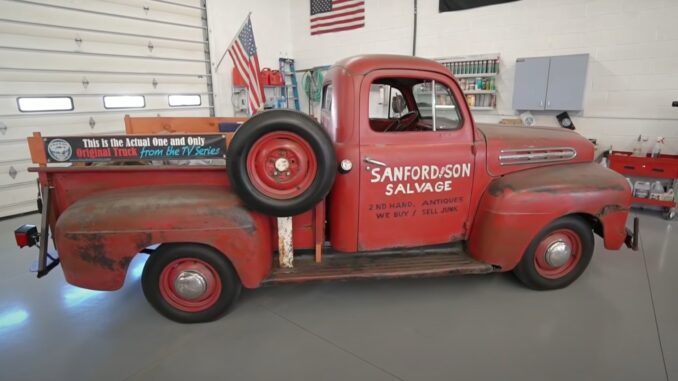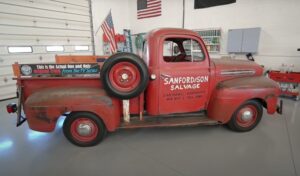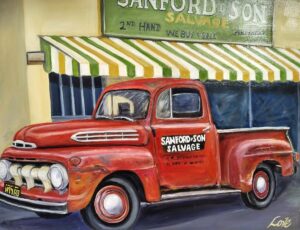
‘Sanford and Son’ truck and Rollo reunite at Hard Rock Rocksino

CLEVELAND, Ohio – When the cranky old comic best known as Fred G. Sanford grabbed his heart, fell to the ground and endured the final Big Ones in 1991, his colleagues I burst out laughing. They thought he was pulling someone else, “Elizabeth, I’ll join you.”
But that’s no joke. Redd Foxx, 69, had a heart attack. Three hours later, he died.
It’s a fitting move for Foxx, an actor who holds nothing sacred. Even in death, he still made them laugh.
“He was one of the greatest and always made people laugh,” said actor Nathaniel Taylor. “I really love Redd.”
You may know Taylor as Rollo – the joking cat in the movie “Sanford and Son”. Yes, that’s him: The guy wearing a classy leather jacket with a dressing plan.
On Sunday, Rollo will come to town. He will be reunited with the iconic “Sanford and Son” truck at Hard Rock Rocksino Northfield Park. The truck, owned by Blueline Classics in North Royalton, was at Hard Rock this week.
Taylor will be with the truck – a red 1951 Ford F1 – from 2-6 p.m. Sunday. For more information, visit hrocksinonorthfieldpark.com.
“I’ll be signing autographs and talking to people about ‘Sanford and Son’ and Redd,” Taylor said by phone from his home in Los Angeles. “I was so lucky to be on that show and it touched my heart that to this day so many people still come up to me and say, ‘Hey Rollo, man, I love you and I love “Sanford and Son.”
No wonder.
Nearly four decades after the junkyard sitcom was dropped, it remains one of television’s most beloved shows. Dozens of websites are devoted to it. It is the subject of academic writing.
“People of all ages, all walks of life, all races and locations connected with that show, because it was about real people living under real pressures and real circumstances,” Taylor said. . “I took pieces of people I knew to create Rollo and we all did that with the show – because it’s about humanity.”
The legacy of Fred’s empire is certainly bigger than trash. “Sanford and Son” was a breakthrough.
From 1972 to 1977, NBC’s top-rated show about a crotchety old man and his son broke down the door for a generation of black entertainers who toiled for years on “chitlin circuit” – a comedy equivalent to Negro Leagues.
At the front of the line is Foxx.
Before he became a star on “Sanford,” Foxx was known for his raunchy party records and black-and-white comedy performances. Before that, he was a wanderer, doing laundry on street corners, sleeping on rooftops, and hanging out in Harlem with Malcolm X.
“Unlike most black entertainers, Redd never forgot where he came from,” Demond Wilson, aka Lamont, told The Plain Dealer. “Most of the characters he plays – Aunt Esther, Bubba, Melvin – are people he already knows from the chitlin’ movie.”
Fred’s nemesis Aunt Esther is played by LaWanda Page, a Cleveland native and a famous comedian before she joined the show.
“Man, LaWanda is amazing and so funny,” Taylor said. “She’s also very encouraging – which means a lot to me because I’m shy and usually keep to myself.”
Taylor never imagined she would become an actor; He was working as a lighting worker at a community theater in Los Angeles when his mentor suggested he try out for the role.
“I was in the audition room when the door opened and hit me, director Aaron Ruben was looking at me and I was still wearing my electric belt from my lighting work,” Taylor said. “So he asked me if I was the electrician here to fix some problems they were having.”
Of course, Taylor told the director that he actually came and wanted to participate, struggled to find a way out and then admitted that he came with ulterior motives.
“He told me to read a few lines and then took me down to Redd Foxx’s room,” Taylor said. “We are both from St. Louis and started talking about it, and the next thing Redd said, ‘Okay, you got the part.’ “
Rollo was born – and immediately became one of America’s most beloved con artists.
“Man, people still come up to me and recite my lines from the marijuana episode,” Taylor said, referring to the “wild parsley” scene in the episode called “The Treasure Garden of Fred”. “The funny thing is I’ve never been that stylish and I’m not much of a gentleman.”
He added: “I have no mack, no game and I am absolutely not a ladies man. “I’m actually quite shy — so imagine how I felt when I realized I could get away with playing Rollo?”

Like a gentleman?
“Ha, I’m already a gentleman — I’m married and have four daughters,” Taylor, 78, said with a laugh.
Testing social mores and improving race relations turned “Sanford and Son” into a taboo-breaking show often considered the black counterpart to “All in the Family.”.
Impossible, according to Wilson.
“‘All in the Family’ is a mean show. There’s no humanity there – just a bunch of people arguing about the issues of the day. That’s why it’s so outdated,” Wilson said. “Wilson said. “‘Sanford and Son’ transcends politics and race. It’s a film about a son and a father who have a love-hate relationship but still need each other to get through life.”
The show’s theme highlights the Hard Rock Rocksino event, which takes place on Father’s Day.
“It has a level of complexity that many people don’t understand,” Wilson added.
What’s wrong?
According to Wilson, “I always heard people – black and white – say it had a lot of racial prejudice”. “But it was the first show where black people were portrayed in a realistic context.”
Taylor agreed and recalled how he took elements of his friends and adapted them to Rollo’s personality.
“It’s a father-son story that transcends race,” Taylor said. “You have Lamont, a homeboy who is very loyal to Fred and always stands by him. On the other hand, Rollo is a street guy looking to get into trouble.”
Much has been made of “The Cosby Show” transcending mainstream white America. But “Sanford” manages to do the same while remaining irreverent – and without creating an upper-middle-class family that could pass as white.
“You could call ‘Sanford and Son’ a breakthrough, but it was part of a larger groundbreaking cultural movement of the 1970s,” Taylor said. “Yes, you had shows television like ‘The Jeffersons,’ ‘Good Times,’ or ‘What’s Happening,’ but you also have ‘exploitation’ films that try to portray life in black America in a realistic way. And that’s really what it is. what ‘Sanford’ is trying to do – be realistic and funny.”
In the world of “Sanford,” characters mix Champagne and Ripple and play a game of losing lottery tickets while surviving in the middle of a junkyard – a conceit you might find in an existential novel or perhaps a reprint of a novel.
“That’s what it’s all about,” Taylor said. “And man, all these years after ‘Sanford and Son,’ I’m still smiling about it all.”